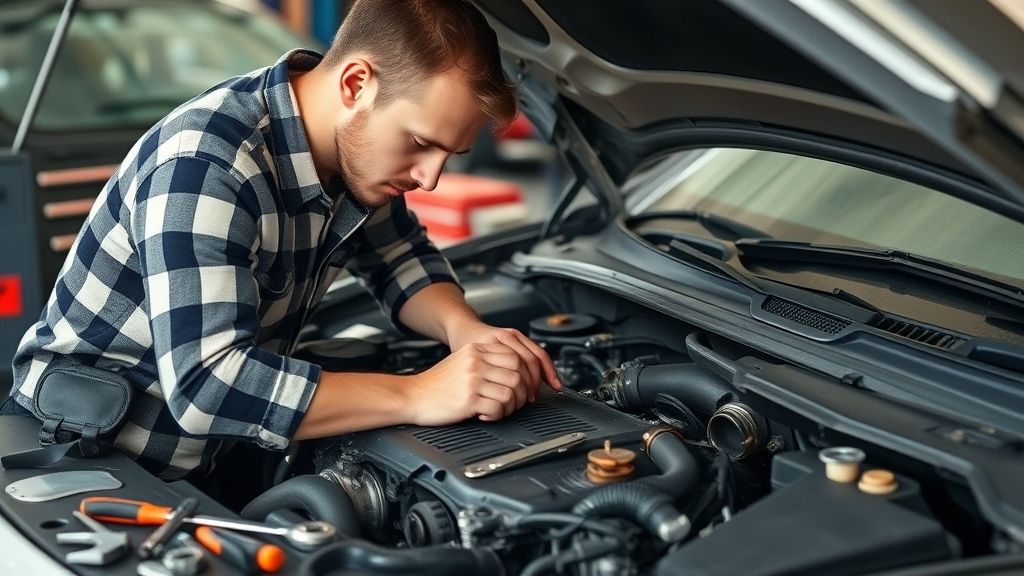Introduction
Understanding the fundamentals of auto repair is essential for every vehicle owner. Whether it’s performing routine maintenance or diagnosing common issues, having a grasp of basic car care can save time and money. This guide aims to equip beginners with the knowledge needed to handle everyday auto repair tasks confidently.
Understanding Your Vehicle
Know Your Car’s Components
Familiarize yourself with the main parts of your vehicle:
- Engine: The heart of your car, responsible for generating power.
- Transmission: Transfers power from the engine to the wheels.
- Brakes: Essential for stopping your vehicle safely.
- Battery: Provides the electrical energy needed to start the engine and power accessories.
- Radiator: Helps regulate engine temperature.
Regular Maintenance Checks
Performing routine checks can prevent major issues:
- Oil Level: Ensure the engine oil is at the correct level and change it as recommended.
- Tire Pressure: Maintain proper tire pressure for optimal performance and safety.
- Brake Fluid: Check and top up brake fluid to ensure responsive braking.
- Coolant: Monitor coolant levels to prevent engine overheating.
- Battery Health: Inspect for corrosion and ensure a secure connection.
Essential Tools for Beginners
Having the right tools makes auto repair tasks more manageable:
- Socket Set: Versatile for various nuts and bolts.
- Screwdrivers: Both flathead and Phillips for different screws.
- Jack and Jack Stands: For safely lifting and supporting your vehicle.
- Tire Pressure Gauge: To check and maintain correct tire pressure.
- Oil Filter Wrench: Makes oil changes easier.
Basic Auto Repair Tasks
Changing Engine Oil
- Warm up the engine to thin the oil.
- Place a drain pan under the oil pan and remove the drain plug.
- Allow the oil to drain completely.
- Replace the drain plug and remove the old oil filter.
- Install a new oil filter and add fresh oil.
Replacing Air Filters
- Locate the air filter housing.
- Open the housing and remove the old filter.
- Insert the new filter and secure the housing.
Checking and Replacing Spark Plugs
- Identify the spark plug locations.
- Remove the spark plug wire and use a spark plug socket to extract the old plug.
- Check the gap on the new spark plug and install it.
- Reconnect the spark plug wire.
Troubleshooting Common Issues
Engine Won’t Start
- Battery: Check for a dead battery or loose connections.
- Starter Motor: Listen for a clicking sound, indicating a faulty starter.
- Fuel: Ensure there’s enough fuel in the tank.
Overheating Engine
- Coolant Level: Check and refill if low.
- Radiator: Inspect for leaks or blockages.
- Thermostat: A malfunctioning thermostat can cause overheating.
Brakes Feel Spongy
- Brake Fluid: Low levels can affect brake responsiveness.
- Air in Lines: Bleed the brake lines to remove air pockets.
When to Seek Professional Help
While many tasks can be handled at home, certain situations require expert assistance:
- Transmission Repairs: Complex and best left to professionals.
- Engine Overhauls: In-depth knowledge and tools are necessary.
- Electrical Issues: Diagnosing and fixing can be intricate.
If you’re in the USA and need professional auto repair services, consider reaching out to Cheema Auto.
Contact Information:
- Phone: 860-938-9036
- Phone: 832-841-1823
Safety Precautions
- Work in a Well-Ventilated Area: Avoid inhaling fumes.
- Use Safety Gear: Wear gloves and safety glasses.
- Secure the Vehicle: Ensure the car is on a flat surface and use wheel chocks.
- Disconnect the Battery: Prevent electrical shocks during repairs.
Conclusion
Embarking on auto repair tasks can be daunting for beginners, but with the right knowledge and tools, it’s achievable. Regular maintenance not only extends the life of your vehicle but also ensures safety on the road. Start with simple tasks and gradually take on more complex repairs as your confidence grows.





